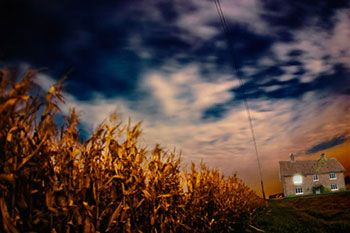
(for Pamela; it was always for you)
My new understanding of ghosts began in a Red Roof Inn in Indiana with the whiskey-wet taste of love like I’d never felt so strongly before, never felt at all before, in fact. Winter wind scratching at the glass, its banshee wail spreading across the sleepless plains while we sat in the floor between the two full-sized beds, warm heat blowing from the heater under the window, and we talked between tasting the liquor on each other’s lips — talked of the snow and the gas station coffee, of the restroom keys chained to bricks, of the lone abandoned shoes on the highway edge lines, and our kisses were addictive, pulling us toward each other from the inside out.
Before then I’d always thought that ghosts were just missed opportunities that came back to haunt us, the regrets of our lives, and spectral visions of futures not significantly different from tainted pasts. And maybe they still are, but . . . they’re more than that, really.
Ghosts fill an emptiness. At least one did here.
It had started in a bar near the motel. Her eyes had glowed orange-brown when I’d flicked the lighter, kissing the tip of her Marlboro with the flame. And they spoke to me, those eyes: they said I’m lonely, are you? The funny thing was . . . that our rooms were in the same motel, on the same floor, and we’d spent so much time deciding whose room to go to, so many cigarettes in romantic contemplation, so many flirtatious looks, gestures, and touches.
We ended up in her room and were going to go down to mine after she freshened up, but the icy-razor breeze outside her door told us to stay inside, not to take the short walk from 209 to 203.
She had come out of her bathroom, fan loud and jangling in her wake, and where she had been wearing jeans and a tie-dyed T-shirt before, she now wore a silky robe, pale yellow with blue roses, and it was cinched tight at the waist. Her toenails were painted blue, dark blue, like the moonless winter sky. Her black hair had a fine reddish tint.
She was half lit, at least, and I was feeling pretty good, too. She turned on the electric coffee maker and emptied one of the packets into the filter before she pulled me onto the floor between the beds. The stinging-bean coffee scent started to clear my head, and I thought — not for the last time — What in hell am I doing here? Only a wall lamp between the beds gave us light.
“What’s your name?” she’d asked in the bar, and she didn’t laugh when I told her it was Lucius.
“Mine’s Fooni,” she said, and I realized why she hadn’t laughed at my own.
“Is that with a p-h?”
“No,” she giggled, “it’s an f. It’s fully phonetic. F-o-o-n-i.” She paused. “Phonetic: f-o-n-e-t-i-c.”
Hippie parents, I thought. I laughed, I mean really laughed, for the first time in a long time.
Things began, as I said, with talk of the road, talk of travel and diners, motels and bars. Fooni sold robes and undergarments and oils, she said. Sensual lingerie and massage oils with sultry-fruit scents.
I thanked God for giving me the opportunity to be in a hotel room with her. I glanced at the Gideon’s Bible on the nightstand, looked away quickly. I reached over without looking, pulled the drawer open, and knocked it inside. Fooni looked at me funny when I shut the drawer, but she didn’t say anything.
She’d been doing it, selling things, for almost two years, ever since a bad divorce and an ex who wouldn’t leave her alone. He called her a “ruiner” now, she said.
She asked me what I did.
“I’m a motivational speaker,” I said, acutely aware that I’d projected and enunciated clearly, and had given her the same beaming-fake smile I’d given thousands of people across the generally-depressed Midwest.
She reached over and touched my knee, looked at my hands folded in my crotch. “Not married,” she said. Not a question.
“No. I was engaged once. We met at one of my seminars. But it just didn’t work out.”
“Why not?”
“I just wasn’t motivated,” I said.
Fooni laughed at this. Truly laughed, like I had about her name. Not one of those I’ll-humor-you-so-we-can-get-on-with-the-sex-and-har-dee-har-har laughs, but one that came from someplace within her, the place where real laughs live, a mysterious organ no doctor or scientist can touch. It was the same kind of laugh I’d heard creeping up through my Aunt Ersie when my Uncle Bub had split the seat of his pants while up on the ladder fixing their storm gutter when I was young. Fooni’s laugh creeped, too—that really is the best word: creeped—before it found its way out in a screaming-balloon squiggle. It was not a sexy laugh, a bit grating actually, but it made me feel warm inside because it was meant for me.

